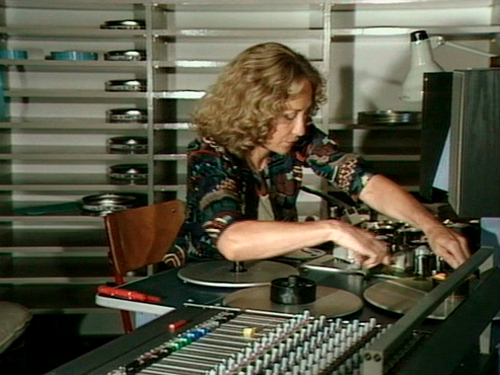
Jean-Luc Godard : C'est peut-être la différence entre l'un et l'autre par rapport à l'image. Moi, ce qui me plaît en elle est inaccessible et toi ce serait ce qui te gênerait… Faut-il montrer les choses? Alors on pourrait dire: moi la télévision me gêne parce qu'elle ne les montre pas alors que toi elle devrait te plaire puisqu'elle ne les montre…
Anne-Marie Miéville : Non, la télévision ne les montre pas tout les temps, donnant à penser qu'elle n'arrête pas de les montrer et que les montrer, c'est ça, c'est ce qu'elle fait. Et que les montrer, c'est de cette manière-là.
Jean-Luc Godard et Anne-Marie Miéville dans Soft and Hard (1985)
Jean-Luc Godard: That's probably the difference between you and me, regarding the image. What I really like in it is its inaccessibility, which is what bothers you… Does one have to show things? You could say I like TV because it doesn't show things. You probably dislike it for the very same reason…
Anne-Marie Miéville: That's not it. Television never shows things, yet it makes you think that it never stops showing them, and this is what showing things is, and that there's no other way to show them.
Jean-Luc Godard and Anne-Marie Miéville in Soft and Hard (1985)
“A 48-minute video that’s premiering in Chicago ten years after it was made, Jean-Luc Godard and Anne-Marie Miéville’s Soft and Hard (A Soft Conversation Between Two Friends on a Hard Subject) is so far in advance of most films and videos made today about the essential properties of both media that it makes not so much Chicago but contemporary Western culture feel like an intellectual backwater. It was commissioned by and originally broadcast on England’s Channel Four, and although most of Godard and Miéville’s talk is in French and subtitled, the funding source is acknowledged in several ways: by the video’s English title, by English intertitles throughout, by many stills from Hollywood pictures (including Frankenstein, Scarface, Rear Window, and the 1948 Joan of Arc) employed as punctuation, by an early sequence of Godard speaking in English on the phone about business arrangements for his film King Lear, and by a brief but moving exchange in English between Godard and Miéville that concludes the work. [...] Indeed, Soft and Hard can be regarded in retrospect as a kind of necessary prelude to the still-in-progress Histoire(s) du cinéma — a work that examines film history “posthumously” in and through the “postfilm” medium of video. That connection becomes fully apparent, however, only in the extended dialogue between Godard and Miéville that dominates the video’s second half, shot from a single angle over Godard’s shoulder as he faces Miéville. This discussion begins with – and periodically returns to – Godard’s problems with his actors on Détective (also released in 1985), which Miéville traces in part to what she calls the weakness of Godard’s dialogue in the film’s love scenes. Godard basically concedes this weakness, remarking that his dialogue is “no better than Alan Parker’s,” and incidentally recalling a comment he made to me in a 1980 interview about his own limitations as a screenwriter and about the frequent disparagement of screenwriting among filmmakers: “Even if you say to a fellow director, ‘You’re better as a screenwriter,’ he feels puzzled, as though being a screenwriter is inferior. But I don’t think that. I think I’m not a very good screenwriter who can be a good director.””
Jonathan Rosenbaum1
« La dialectique est désignée sous l’angle de l’opposition, software et hardware, le programme et la quincaillerie, le doux et le dur, le féminin et le masculin. Elle et lui, en face à face final et durable, semblent le confirmer. Pourtant, Miéville est seule à la table de montage. Godard est seul dans un lit entre sommeil et prises de notes. Elle est face à l’objectif pour repasser. Il nous fait face pour jouer au tennis. Elle marche dans la campagne, il reste dans la voiture. Ils s’interrogent sur leur capacité à faire un film sur le couple peu de temps après la sortie de Détective (1985). »
Gilles Grand
- 1Jonathan Rosenbaum, “Godard in the Age of Video [SOFT AND HARD],” Chicago Reader, 17 November 1995.

